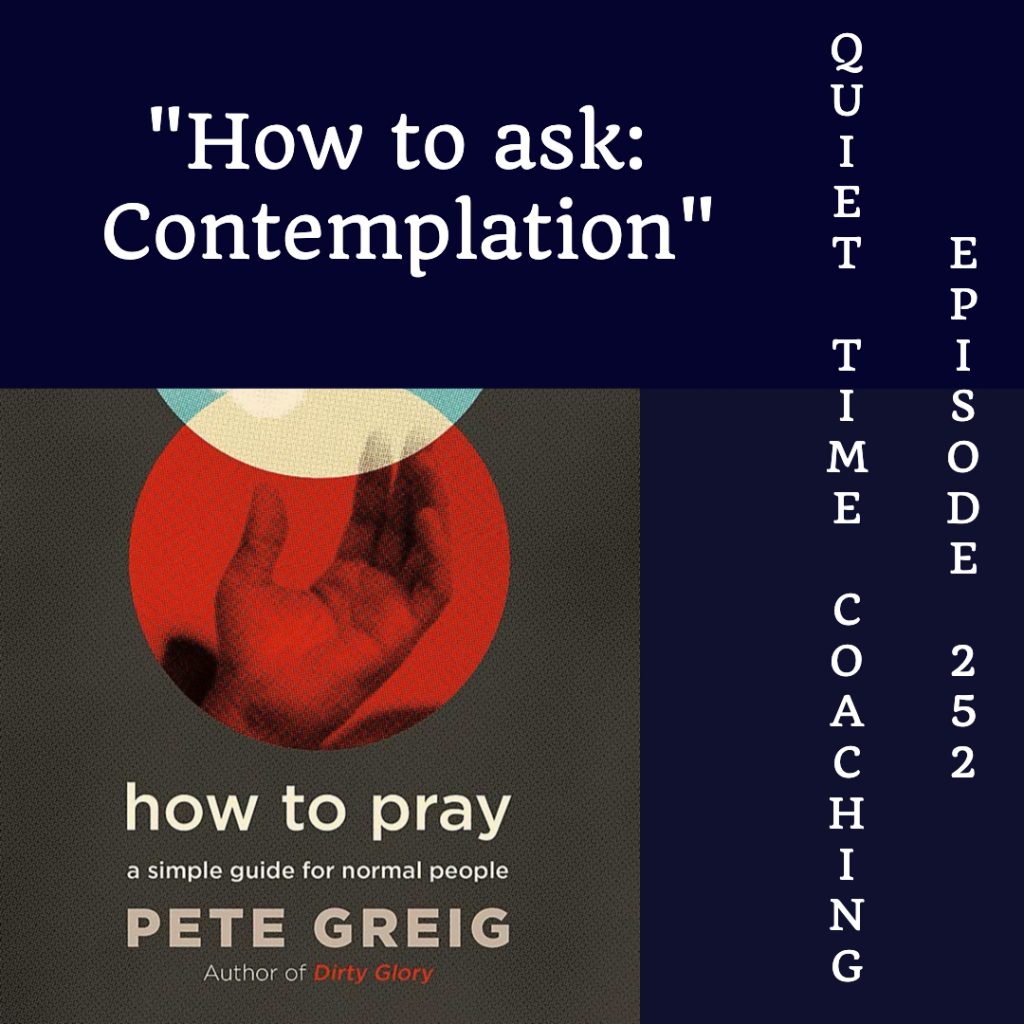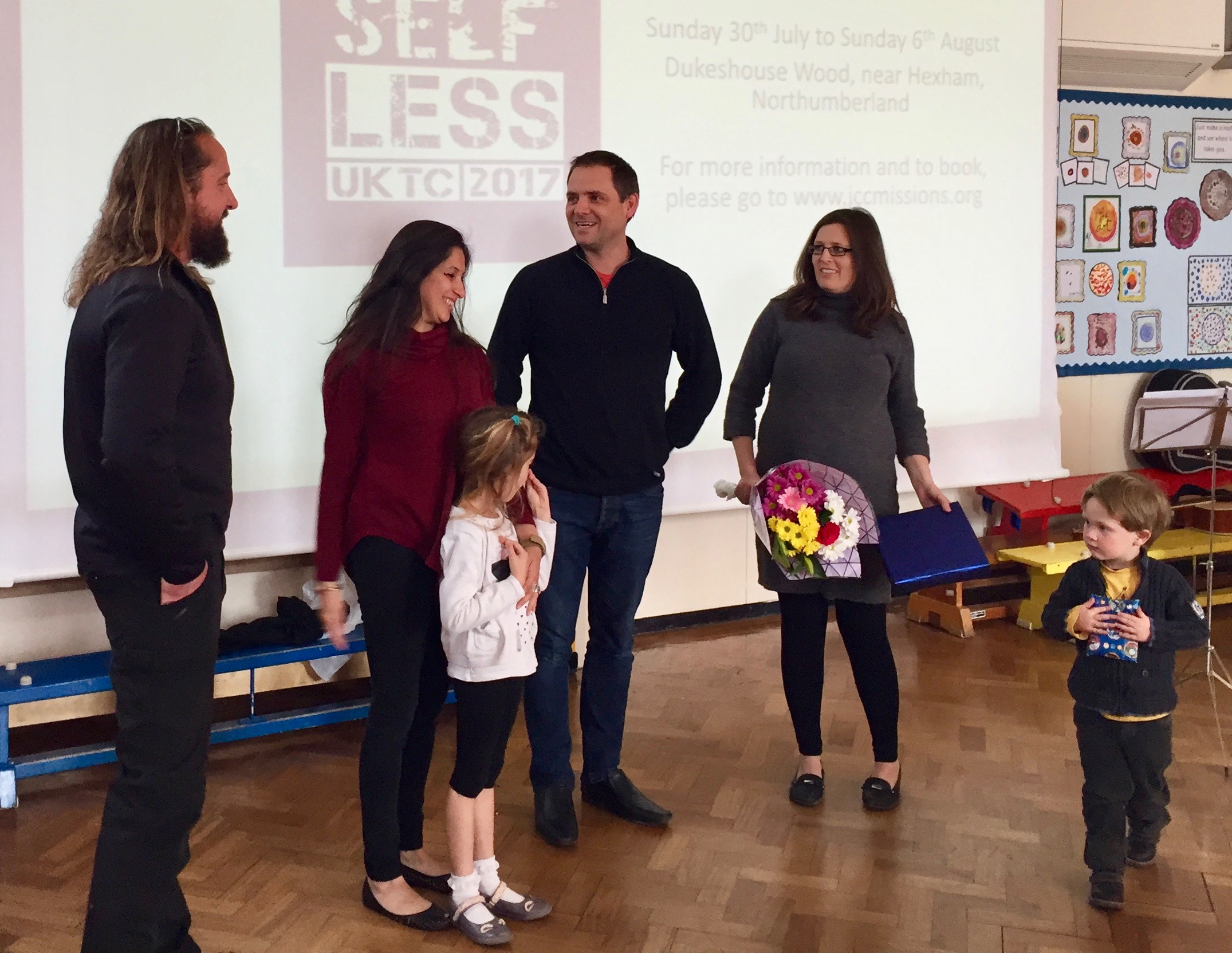Quiet Time Coaching Episode 252

Quiet Time Coaching Episode 252
- I am in my third year of participating in the Renovare book club. The first book in this season’s set of four is “How to pray” by Pete Greig.

- Quiet time coaching episodes will focus on his book for the next few weeks. You don’t need to read it to benefit from these recordings, but you might like to get hold of a copy for yourself. I have finished the book and can thoroughly recommend it. A full review of the book will come at a later date in “What we are reading”.
- Last week we explored unanswered prayer – how to handle disappointment in prayer
- Today we will reflect on the eighth chapter of the book, “Contemplation: How to pray without words”. Theme scripture: “‘On earth as in heaven.’” (Matthew 6:10 NIV11)
- First, let’s consider what we’re talking about when we discuss contemplative prayer.
“If petition is prayer at its simplest, and intercession is prayer at its most powerful, contemplation is prayer at its deepest and most personally transformational.”
Greig, Pete. How to Pray: A Simple Guide for Normal People (p. 121). John Murray Press. Kindle Edition.
- We make requests in prayer, we talk to God about our needs, all that is good. But, does it change us? Does it assist in making us more Christlike? Certainly it seems to be part of the package, but isn’t there more?
“Richard Foster describes it as ‘a loving attentiveness to God’ in which ‘talk recedes into the background, and feeling comes to the foreground’.” (p. 122)
- In essence, contemplative prayer Is about enjoying the presence of Christ, rather than doing anything with it.
“Contemplation is stargazing rather than astronomy, listening to jazz rather than hearing a talk.” (p. 122)
- Do the Scriptures support this concept? Yes they do: ‘May the … meditation of my heart be pleasing in your sight’ (Ps. 19:14) ‘For God alone my soul waits in silence’ (Ps. 62:1, ESV) ‘Be still, and know that I am God’ (Ps. 46:10)
- Finally, consider the example of Jesus. He prayed all night several times. Do we honestly think he spent the entire night talking? Is it not reasonable to assume that he meditated on the Word, waited on his father in silence, and enjoyed stillness in the presence of the father?
- If I spend all my time with my wife talking, things don’t go well!
- With these thoughts in mind, let’s turn to some suggestions from the book to help us understand and practice contemplative prayer.
1. Meditation – the ‘me and God’ stage
“Contemplation begins with meditation – fixing your thoughts on a picture, an object, or most frequently on a phrase from the Bible.” (p. 125)
- The stage is where we are bringing a present consciously into the presence of God. Or rather, perhaps, acknowledging his presence. It’s a surrender to the reality of God and a connection with him.
- You might find a Bible phrase, a tree you can see through the window in your garden, or a candle to be something that helps to focus your attention.
- At the time of writing I am pulling the curtain in my office first thing in the morning, sitting in a comfortable chair and looking out of the window at a hedge with red berries. It’s dark when I start but still light enough so that I can see those splashes of red.
2. Contemplation – the ‘God and me’ stage
- At this point we are no longer the centre of attention. Instead, it is our heavenly father.
“Prayer is no longer something I’m ‘doing’, but something I’m being in the presence of God.” (p. 126)
- We experience acceptance, the pleasure of God in being with us, and a palpable sense of security.
3. Communion – the ‘only God’ stage
- Have you ever been so wrapped up in a book or a film that you’ve forgotten where you are. You’ve ceased to notice the temperature of the room, the seat you are occupying, your worries about what you’re going to do next. All that absorbs you is what you are currently engaged in.
“Perfect prayer is not to know that you are praying.” (p. 127)
- This is not where we live all day every day, but it is a window into what the next life might be something like. The constant absorption and enjoyment of communion with God.
Time for a reflection. Are you convinced yet that this matters? For some of us it might seem as natural as a dog taking to water. The others I suspect it seems like a foreign language. It’s time for a longer quote from the book:
” Let me say this as clearly as I possibly can: your soul is crying out for a deeper encounter with Christ and, if your faith is to thrive for years to come, if it is to survive the coming seasons of darkness and pain, if you are to know and be known by Jesus in a richer, more fulfilling way, if you are to continue to engage with him when words no longer have meaning, if you are to become the loving person he wants you to be and to see the world the way he sees it, you must make space in your busy life for regular meditation, contemplation and communion with God. (pp. 127-128)
- Many of us bemoan the fact we don’t feel that we or people around us in our churches are growing as much as they could. Is at least part of the answer that we are not spending enough time consciously in the presence of God? Could contemplative prayer be one of the keys to this lock?
4. Contemplation as a way of being
- Our pain can obscure God’s power. Yet, no matter our confusion or disappointment, it makes no difference to the potentiality of the power of God in any particular circumstance.
“..when we meditate regularly on God’s goodness, and saturate our consciousness in his love, we become like him.” (p. 128)
- This scripture speaks to such a vision: ‘We all, who with unveiled faces contemplate the Lord’s glory, are being transformed into his image with ever-increasing glory.’ 2 Corinthians 3:18
- As brothers and sisters in Christ we help each other cooperate with the work of the Spirit in each other’s lives. That’s what Christian fellowship provides amongst other things. However, we will never become more like Christ simply by human action. We need, desperately need time in the presence of God for that.
5. Contemplation as a way of seeing
- Spending time with God changes the way that we see ourselves and our heavenly father, but also the way we see the rest of the world.
The more we see Christ in prayer, the more we see him everywhere we go and in everyone we meet. The whole of life becomes an invitation to worship. (p. 129)
- If you want to see the world changed by the love of Christ, perhaps we might put more effort not into direct evangelism, or even social action, but, first, contemplative prayer. If God can change the way we see the world, it may be that true that we are changed enough for the world to see God through us.
Conclusion
- Pete ends the book with this Prayer poem by Isaac of Stella:
He himself is my contemplation. He is my delight. Him for His own sake I seek above me. From Him Himself I feed within me. He is the field in which I labour. He is my cause. He is my effect. He is my beginning. He is my end. He is for me eternity. (p. 131)
- Questions for discussion:
- What stands out to you about contemplative prayer?
- How might your prayer life grow if you could learn how to practice contemplative prayer?
- Suggestion: Focus on contemplative prayer for the next seven days.
- Resources mentioned in the book:
- PRAYER COURSE SESSION: #6: Contemplation.
- PRAYER TOOLS: 1. Silent Prayer. 2. How to Retreat for a Day. 3. How to Undertake a Pilgrimage (prayercourse.org).
- FURTHER READING: The Sacred Year, by Michael Yankoski.
- Next week we will go on to look at listening in prayer.
- Please add your comments on this week’s topic. We learn best when we learn in community.
- Do you have a question about teaching the Bible? Is it theological, technical, practical? Send me your questions or suggestions. Here’s the email: malcolm@malcolmcox.org.
- If you’d like a copy of my free eBook on spiritual disciplines, “How God grows His people”, sign up at my website: http://www.malcolmcox.org.
- Please pass the link on, subscribe, leave a review.
- “Worship the LORD with gladness; come before him with joyful songs.” (Psalms 100:2 NIV11)
- God bless, Malcolm
- PS: You might also be interested in my book: “An elephant’s swimming pool”, a devotional look at the Gospel of John


